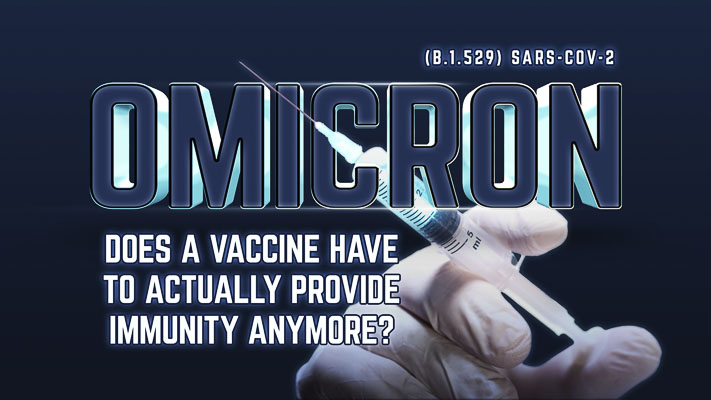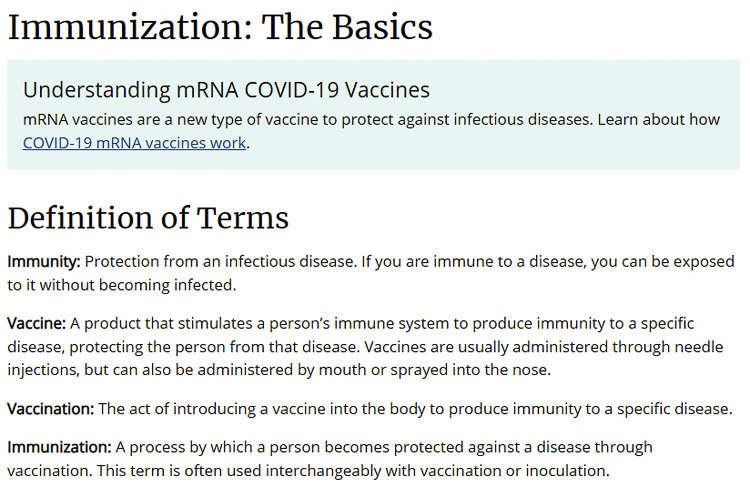
Omicron variant adds to concerns about protection offered by COVID-19 vaccines
Dr. Ryan Cole recently addressed a crowd at a “Texas COVID-19 Summit” and discussed vaccines and the pandemic. He was joined by eight other doctors providing information and perspective about COVID-19, the vaccines, and the body’s immune system.
“In order to be a vaccine, it has to provide 12 months of immunity, and it has to actually provide immunity,” Cole said. “Unless, of course, you’ve changed the definition of what a vaccine is. And nobody would have done that, like the CDC in the last couple months, would they?”
The Centers for Disease Control and Prevention (CDC) has carefully “evolved” the definition of vaccination to meet the declining ability of some of today’s “vaccines,” including the FDA-approved U.S. COVID-19 vaccines.
The original definition, prior to 2015, stated that vaccines “prevent … disease.” Starting in 2015, the definition was altered to say that vaccines “produce immunity,” without necessarily preventing disease.
After the COVID-19 vaccines were introduced, and it was discovered they do not necessarily “prevent disease” or “provide immunity,” the CDC altered the definition of vaccines again to say that they merely “produce protection.”

Before the changes, the definition for “vaccination” read, “the act of introducing a vaccine into the body to produce immunity to a specific disease.” Now, the word “immunity” has been switched to “protection.”
The term “vaccine” also got a makeover. The CDC’s definition changed from “a product that stimulates a person’s immune system to produce immunity to a specific disease” to the current “a preparation that is used to stimulate the body’s immune response against diseases,” (emphasis added).
The discovery was publicized by Rep. Thomas Massie (Republican, Kentucky) two months ago, who tweeted the definitions. “Check out @CDCgov’s evolving definition of “vaccination.” They’ve been busy at the Ministry of Truth.”
Instead of requiring medicine to meet the definition of “vaccine,” it appears CDC has changed the definition of “vaccine” to accommodate what the medicine does.
Some people have speculated that the unannounced changes were the CDC’s attempt to hide the fact COVID-19 vaccines are not 100 percent effective at preventing coronavirus infection. Massie’s tweet triggered a response from the CDC which said the “slight changes in wording over time … haven’t impacted the overall definition.”
The previous definitions could have been “interpreted to mean that vaccines were 100 percent effective, which has never been the case for any vaccine, so the current definition is more transparent, and also describes the ways in which vaccines can be administered,” the spokesperson said.
“It’s also important to note that the modifications to the definition of ‘vaccine’ don’t change the fact that vaccines and the act of vaccination has prevented millions of illnesses and saved countless lives,” the spokesperson said at the time.
For years, the Merriam-Webster dictionary definition for the word “vaccine” had the following wording according to one news report.
“A preparation of killed microorganisms, living attenuated organisms, or living fully virulent organisms that is administered to produce or artificially increase immunity to a particular disease,” (emphasis added).
On May 24, 2021, dictionary editors revised it to read, in part:
“A preparation that is administered (as by injection) to stimulate the body’s immune response against a specific infectious agent or disease.”
“This definition has been revised to reflect both more scientifically accurate language and the fact that we have more space in the online dictionary,” said Peter Sokolowski, editor at large of Merriam-Webster.com. “We are now able to provide much more context and detail than previously possible in print dictionaries. The wording had originally been drafted in order to accommodate the space restrictions of our print editions, where definitions necessarily had to be as brief as possible.”
July 10, 2012https://t.co/2eiRJbdMBn
— Thomas Massie (@RepThomasMassie) September 8, 2021
February 14, 2015https://t.co/xfHLyKQL3I
August 26, 2021https://t.co/yjdLysHgQk
September 2, 2021https://t.co/dyoQ73SIRB
Other vaccines
Not all vaccines provide lifetime immunity. When it comes to the tetanus vaccination, it’s not one and done. You receive the vaccine in a series. It’s sometimes combined with vaccines that protect against other diseases, such as diphtheria. A booster shot is recommended every 10 years.
The chickenpox vaccine is administered in two shots. Two doses of the vaccine are about 90 percent effective at preventing chickenpox. which causes about four million cases, about 10,600 hospitalizations and 100 to 150 deaths annually, according to the CDC.
“Polio can be prevented with a vaccine,” says the CDC. An inactivated polio vaccine (IPV) is the only polio vaccine that has been given in the United States since 2000. It is given by shot in the arm or leg, depending on the person’s age. Oral polio vaccine (OPV) is used in other countries.
They recommend that children get four doses of polio vaccine. Almost all children (99 out of 100) who get all the recommended doses of polio vaccine will be protected from polio, according to the CDC.
Vaccines are available that can help prevent whooping cough, also known as pertussis. Also in the “prevent” category, the CDC lists diphtheria, Hepatitis A and Hepatitis B. Measles can be prevented with the MMR vaccine. The vaccine protects against three diseases: measles, mumps, and rubella.
Yellow fever can be prevented by vaccination. A single dose of yellow fever vaccine provides long-lasting protection, and a booster dose of the vaccine is not needed for most people. However, some travelers may require a booster dose according to the CDC.
Yet the rapidly developed COVID-19 vaccines developed appear to have waning immunity. The FDA and the CDC have now approved “booster shots” of the vaccines after just six months. This is because the virus has changed.
The COVID-19 vaccines were developed using the Alpha variant of the coronavirus. Yet it was the Delta variant that caused the huge wave of sickness and deaths this past summer. Breakthrough cases became common as both vaccinated and unvaccinated individuals got sick. It appears waning immunity happens in many individuals after four to six months following the original vaccination.
Omicron variant
The CDC now says everyone 18 and older should get booster shots due to the new, Omicron variant. Will the current vaccines protect against this new variant? They only offered some level of “reduced sickness” against the Delta variant.
Three different CDC definitions of vaccines from 2012 to the current version. The first is from 2012 where the word “prevent” was included. The word “immunity” was later removed as the current COVID-19 pandemic vaccines proved to not provide immunity. The revised definition now indicates a vaccine offers “protection”. Graphics from CDC
President Joe Biden briefed the press yesterday that Dr. Anthony Fauci of the CDC believes the current vaccines will provide some level of protection against Omicron. The vaccine makers are not so sure.
“I want to reiterate, Dr. Fauci believes that the current vaccines provide at least some protection against new variants, and the booster strengthens that protection significantly,” Biden said at a press conference. “We do not yet believe that additional measures will be needed.”
Yet he then went on to say his team is working with officials at Pfizer, Moderna, and Johnson & Johnson to develop a specific booster or new vaccine if needed.
While testing has just started, the drugmakers have expressed concern that COVID-19 vaccines won’t work as well against the new strain. They have raised the prospect that existing COVID-19 vaccines might be less effective against the new Omicron variant of the coronavirus, which could create a need for modified vaccines that better target the newest variant of the virus.
Stéphane Bancel, the CEO of Moderna, said in an interview published Tuesday that current vaccines for COVID-19 will likely be much less effective against the new Omicron variant. “I think it’s going to be a material drop,” he told the Financial Times. “I just don’t know how much because we need to wait for the data. But all the scientists I’ve talked to . . . are like, ‘This is not going to be good.’”
All of which leads back to the question many people have. Is this a legitimate “vaccine?” Are the approved shots merely a tool that reduces sickness? And if that is the case, then why are they being mandated, given their reduced effectiveness against the Delta variant and new fears of their effectiveness against Omicron?












